The Feasibility of Sustainability
What Future Are We Creating?
Last July the UN Chief declared that we are in the ‘Era of Global Boiling,’ signaling the urgency of our situation, yet we continue to ignore his pleas. Escalating fossil fuels investments, wars, and divisive politics bring “The Feasibility of our Sustainability” into question.
We are compelled to examine the complex array of sustainability-related issues, the glaring disparities in responses, and the effectiveness of those responses. We will look at the challenging path toward a harmonious coexistence and explore the pressing questions that define our collective future.
To discuss the subject of “Sustainability,” we must agree on what “Sustainability” is and what it would look like.
Defining Sustainability
The United Nations defines sustainability as:
- “Meeting the needs of the present without compromising the ability of future generations to meet their own needs.”
This broad definition is reflected in the UN’s 17 Sustainable Development Goals (SDGs). Many climate/environmental activists point to our current “Development Models” as the primary contributing factor to our sustainability challenges; so, to achieve “Sustainability” we would have to redefine “Development.”
For this piece, we define Sustainability as:
“Our Ability to create a Sustainable Global Civilization; that harmoniously integrates the needs of all human beings with the needs of our planet, environment, and other living species.” In this context “Sustainability” is a global transformation project.
To assess the feasibility of achieving a state of sustainability we must:
- Understand the nature of the threats we face.
- Understand the scope, scale, and urgency of the problem.
- Understand the Critical Success Factors.
- Identify the Primary Challenges and Weaknesses.
- Determine our capacity to implement effective corrective measures.
Our Threats and Challenges
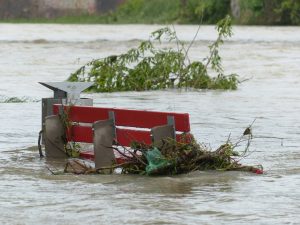 In this pivotal moment in history, humanity confronts a convergence of global challenges that, if left unaddressed, could lead to our collective extinction.
In this pivotal moment in history, humanity confronts a convergence of global challenges that, if left unaddressed, could lead to our collective extinction.
Researchers have identified three major types of existential threats, Natural Threats such as Asteroids and Super-volcanic Eruptions, Anthropogenic or man-made threats such as Climate Change, Nuclear War and Environmental Erosion, and Emerging threats such as Pandemics, Malevolent AI, and Global Tyranny.
Foremost among these threats are Global Warming, Environmental Erosion, and the persistent specter of Nuclear War. This presentation will focus on two of the anthropogenic or man-made threats as they pose the highest immediate risks.
We will focus on the two of the existential threats stemming from human activity I two areas:
- Climate & Environment – Climate Change – Global Warming – Environmental Erosion
- Governance & Human Relations – Economic Inequity – Social Justice – War & Oppression
Climate & Environment
The Earth’s climate is undergoing rapid and unprecedented changes, primarily driven by human activities. According to the latest report from the United Nations Intergovernmental Panel on Climate Change (IPCC), global temperatures have risen by 1.1°C above pre-industrial levels. This warming trend disrupts ecosystems, alters weather patterns, and accelerates the melting of polar ice caps, contributing to rising sea levels. The report emphasizes the urgency of limiting global warming to 1.5°C to avoid catastrophic consequences.
The degradation of natural habitats and ecosystems is occurring at an alarming rate. The UN’s Global Biodiversity Outlook 5 report states that approximately one million animal and plant species are threatened with extinction, many within decades. Deforestation, industrialization, and unsustainable agricultural practices have led to a loss of biodiversity and diminished natural resources. This erosion of our environment threatens the delicate balance necessary for life on our planet.
Other than Climate/Environment related threats all the other sustainability related issues recognized by the United Nations are “Quality of Life” related, they are all issues related to delivery of “The Social Contract.”
The Global Social Contract is an ideological understanding between the people and those they empower and entrust to rule over them. Documents such as the UN Charter, the Declaration of Human Rights, and National Constitutions outline the principles of the understood social contract. It is a solemn pact that places the well-being, rights, and dignity of individuals at the forefront.
Our current state of international unrest, economic inequity and instability and the large numbers of people in extreme poverty or displaced by crisis, is evidence of our inability to deliver on the social contract. If we are unable to effectively address these increasingly volatile situations could lead to the next existential threat:

Nuclear War
Our historical patterns of international relations are particularly pertinent when considering the sustainability of our global dispute resolution model; Mutually Assured Destruction (M.A.D). This strategy involves the stockpiling of nuclear weapons capable of obliterating the world multiple times over, under the premise that they will never be used. This approach is not only irrational but also morally questionable. One of the most perplexing aspects of M.A.D is its inherent illogicality. The idea that security is best ensured through the possession of weapons that, if deployed, would lead to the annihilation of both aggressor and defender defies all reason. It's a precarious balance of terror that rests on the assumption that rationality will prevail in all circumstances—a risky bet when the consequences of failure are so catastrophic. Furthermore, the global nuclear arsenal is a staggering three times the number needed to decimate every corner of the planet. This colossal surplus of destructive power not only represents a gross misallocation of resources but also underscores the urgent need for disarmament. It raises the critical question of why we continue to invest in weapons that far exceed any conceivable strategic need.
The 17 Sustainable Development Goals
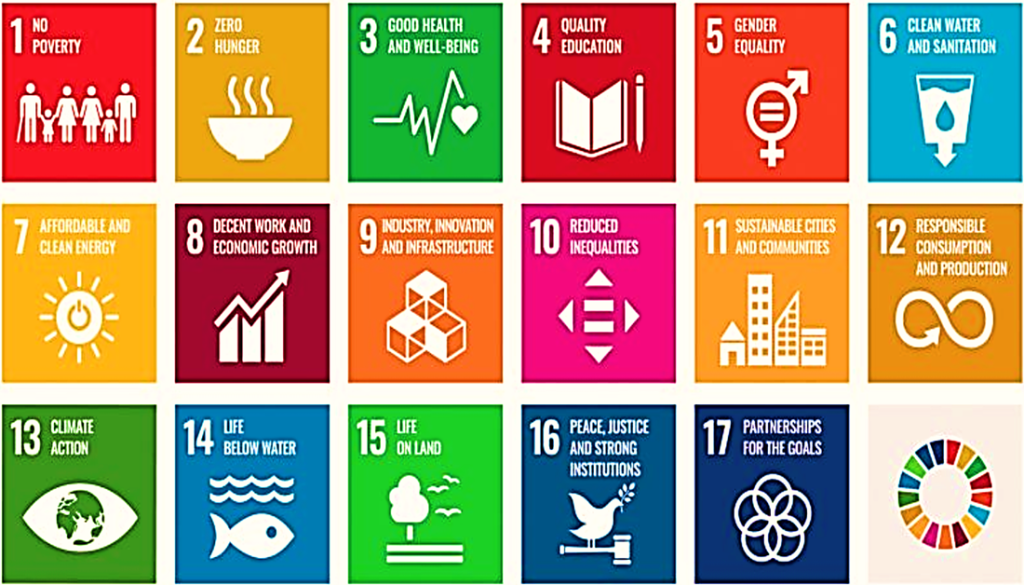
Scope, Scale, and Urgency of the Environmental/Global Warming Problem:
The scope and scale of the challenges is evident in the title of the climate phenomenon “Global Warming;” these are “Global” problems that require Global level solutions, decisions, and standards. These problems cannot be resolved by any one country or region, nor can any country or region escape the consequences of inaction.
The urgency of the problem is underscored by the haunting question posed by Sir David Attenborough: “Is this how our story is due to end; a tale of the smartest species, doomed by that all too human characteristic, of failing to see the bigger picture, in pursuit of short-term goals?”
This emotional query captures the essence of our predicament. The urgency to respond to the multifaceted crises we face is emphasized by the conundrum of our ability/inability to see beyond personal and short-term objectives determining our fate as a species.
The Inter-Governmental Panel on Climate Change has emphasized the need for “rapid and far-reaching” low-carbon transitions across various sectors. Many scientists are of the opinion that we are nearing or at “The Tipping Point,” the point where we will no longer be capable of meaningful corrective actions. Failing to take the appropriate corrective actions now will result in profound alterations to human and natural systems, including increases in extreme weather events, sea-level rise, and biodiversity loss. A deep look into the intricate layers of these challenges beckons a call for global systemic change.
Root Causes - Unsustainable Governance Systems
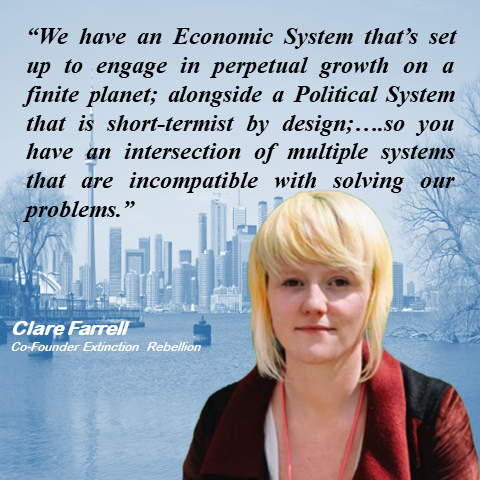 This is a pivotal moment in history, humanity is confronted by a convergence of global challenges that, if left unaddressed, could lead to our collective extinction. Foremost among these threats are Global Warming, Environmental Erosion, and the persistent specter of Nuclear War.
This is a pivotal moment in history, humanity is confronted by a convergence of global challenges that, if left unaddressed, could lead to our collective extinction. Foremost among these threats are Global Warming, Environmental Erosion, and the persistent specter of Nuclear War.
During an interview in August 2022, Clare Farrell, founder of Extinction Rebellion, was on point regarding the factors that contributed to our social and environmental threats: “We have an economic system that set up to engage in perpetual growth on a finite planet, alongside a political system that is short-termist by design. …. So you have an intersection of multiple systems that are incompatible with sustainability.”
We have embraced and implemented systems and structures that are not compatible with sustainability or human well-being.
Concerning our environmental challenges, the biggest systemic challenge is our economic and social dependence on fossil fuels. Our transformation to clean energy will be a long and complex process and will result in a massive transfer of wealth; this serves as a significant motive for resistance from oil companies and oil-producing nations. As difficult and costly as the change will be there is no option; the alternative is the extinction of our species. There is no adapting to this problem; the only option is to change the systems and behaviors that are detrimental to our planet, and environment; our home.
We have been aware of the perils of carbon emissions for more than a century; since then every effort to sincerely address the problem has been derailed. We can only hope that the current environment and social conditions are bad enough now to motivate our leaders to engage in meaningful change.
With respect to our governance and social challenges, they stem from the divisive principles that have underpinned our governance paradigms for centuries. Greed, hate, deception, and exploitation have left an indelible mark on our socioeconomic model, giving rise to a system that fosters inequality, perpetuates environmental degradation, and thrives on conflict.
Our current socioeconomic framework, rooted in Euro/US Colonial Capitalism, was forged through some of the most egregious humanitarian crimes in history. It endures through the extraction of resources and the oppression of entire nations. The insidious strategy of Divide and Conquer plants seeds of hatred, racism, and bigotry, while marketing campaigns perpetuate excessive consumption, contributing to environmental degradation and perpetuating poverty.
Historical exploitation of resources, driven by colonial practices and a focus on economic growth at any cost, has laid the foundation for the disparities we witness today. Statistical evidence on historical resource extraction and its socio-economic impact provides valuable insights into the root causes of our current challenges.
Unsustainable practices, fueled by short-term economic interests, have led to the degradation of ecosystems, social inequalities, and the overconsumption of resources. Acknowledging these contributing factors is the first step toward rectifying our course.
The social contract of “Modern Civilization” promises freedom, equal opportunity, and justice to the people; however, few nations can claim that they even come close to delivering on this contract. In almost every nation there are groups of people crying out for justice because our governance structures and systems are based on barbaric values while preaching noble values. I refer to this as a state of Civil Hypocrisy.
This is not a question of left or right politics, it is a picture of the foundation of our governance and socio-economic models. While many of us have enjoyed comfortable lives due to these social models, a great deal more have suffered and continue to suffer. The fact that we are facing these crises is evidence of the failures in the system. We have the technological and scientific capability to mitigate the environmental damage we do, and effectively integrate our diverse needs, attributes, and assets to create a fair and equitable global civilization. The question is do we have the will to build a better world, or are we committed to selfishness and self-destruction?
Critical Success Factors
- Full Collaboration and Cooperation of all Global Heads of State
This is a critical global situation, collaboration on all levels in all sectors of government and industry across the globe is the most critical factor for successful implementation.
- Establishing an environment of peace and mutual respect.
We can’t possibly have global collaboration and cooperation while we maintain these relationships of enmity, distrust, and conflict. We must be able to create an environment of peace and mutual respect, to have any hope of globally accepted sustainable practices and standards. To establish an environment of peace, we must:
- Change in Leadership and Governance Ideology (Elevation of our Consciousness)
In her inspirational address at the COP26 Climate Summit in 2021, Mia Mottley, P.M. of Barbados posed the question that will determine our future; “When will Leaders Lead?” Leaders are charged with making decisions on behalf of the masses and therefore must have a holistic perspective, instead of a personal or narrow perspective, on issues. We have never needed united, honorable, and competent leadership more than we do now. Instead, we are witnessing unprecedented levels of social unrest, protests, divisive politics, and authoritarian governance across the globe.
Our survival and sustainability are completely dependent on the decisions and actions of our global leaders moving forward.
Einstein’s quote “No Problem can be solved from the same Level of Consciousness that Created It” clearly expresses the first and most critical change that must take place: an evolution of leadership consciousness.
The Desperate Call for Conscious Leadership:
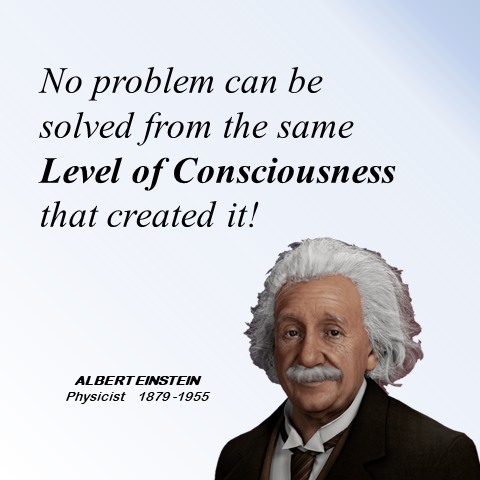 Amid crisis and chaos, a call emerges for a profound shift in collective consciousness. This call, resonating with activists and everyday individuals alike demands a shift in leadership ideology from “Crisis to Consciousness.”
Amid crisis and chaos, a call emerges for a profound shift in collective consciousness. This call, resonating with activists and everyday individuals alike demands a shift in leadership ideology from “Crisis to Consciousness.”
In her inspirational address at the COP26 Climate Summit in 2021, Mia Mottley, P.M. of Barbados posed the question that will determine our future; “When will Leaders Lead?” Leaders are charged with making decisions on behalf of the masses and therefore must have a holistic perspective, instead of a personal or narrow perspective, on issues. We have never needed united, honorable, and competent leadership more than we do now. Instead, we are witnessing unprecedented levels of social unrest, protests, divisive politics, and authoritarian governance across the globe.
We have too many individuals in leadership roles that function on a Selfish or Tribal Level of Consciousness. When we have individuals making decisions that impact millions of people, that only focus on personal gain, we have a recipe for social disaster. We are starting wars and revolutions while facing multiple existential threats that require Global Cooperation. We see the planet deteriorating before our eyes, yet we are doubling- down on fossil fuel production, and once again pushing the responsibility to the next generation. We know that our economic model is logically and morally flawed and unsustainable; however, we will deny and ignore this reality, undermine every feasible solution, and cling to our pyramid scheme; hoping for our turn at the trough. This is the highest level of leadership immaturity, incompetence, and irresponsibility ever displayed.

The Imperative of Spiritual Intelligence
Spiritual Intelligence (SQ) is the only academic discipline designed to embark on a journey of conscious evolution. It transcends religious or faith-based affiliations, encapsulating our perceptions of purpose, values, and morals. This goes beyond the intellect and encompasses qualities like empathy, compassion, and interconnectedness. In the same manner that the widely accepted field of Emotional Intelligence (EQ) helps us recognize, understand, and master emotionally charged situations; Spiritual Intelligence helps us recognize, understand, and master situations that are morally and ethically challenging. Embracing Spiritual Intelligence is essential to shedding the divisive, destructive, and poisoned ideologies that are intwined in our governance systems and social cultures. Integrating SQ with our education and professional development systems is paramount in developing a leadership culture that is committed to our transformation to sustainability. Shedding these destructive belief systems and behaviors will pave the way for us to engage in global collaboration and build sustainable systems for the wellbeing of all human beings.
The Role of Individuals in Systemic Transformation
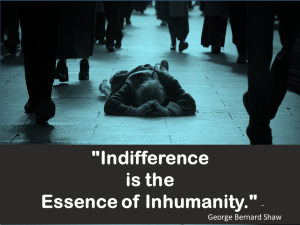 Our survival is dependent on our ability to care about each other’s well-being, on a global level. An examination of the many global initiatives for sustainability highlights the importance of coordinated and collaborative efforts to achieve a more sustainable and equitable world. We all have a role to play. Individuals armed with knowledge and a sense of responsibility can be catalysts for systemic transformation. This involves challenging ingrained beliefs, advocating for just policies, and actively participating in initiatives that promote sustainability and social justice.
Our survival is dependent on our ability to care about each other’s well-being, on a global level. An examination of the many global initiatives for sustainability highlights the importance of coordinated and collaborative efforts to achieve a more sustainable and equitable world. We all have a role to play. Individuals armed with knowledge and a sense of responsibility can be catalysts for systemic transformation. This involves challenging ingrained beliefs, advocating for just policies, and actively participating in initiatives that promote sustainability and social justice.
Leading by example is the best strategy for each of us as individuals. We are all in different situations, and we all have different skills/resources to offer. The best we can do is (using the 17 SDGs as a guide) support and promote policies, practices, and people that are advancing the cause of Sustainability.
Conclusion: Navigating the Path to Sustainability
This discourse consistently employs the terms “Our” and “We” to underscore the collective identity of humanity sharing a singular planet. While each of us navigates individual circumstances, the destiny of our collective existence hinges on the choices we collectively embrace and empower in policies and practices. Our history, a dual beacon of caution and guidance, illuminates the immense challenges we confront. Simultaneously, our history reflects the boundless capacity for human innovation, evident in our strides in technology and science.
The paramount impediment to attaining sustainability lies in our collective inability to collaborate for the common good. Overcoming tribal thinking is imperative; without genuine collaboration on the global stage and the development of effective corrective measures, achieving sustainability remains elusive. Our current global landscape and trajectory suggest a considerable distance from the prerequisites for steering toward a sustainable future.
Envisioning a future where sustainability isn’t a mere aspiration, but a tangible reality compels every individual to become a steward of positive change. This call extends beyond systemic transformation; it demands a profound shift in our collective consciousness. The envisioned era sees the principles of peace, equity, and justice guiding our interactions with one another and our shared planet. In this transformative journey, every uttered word, every action, and every conscious choice becomes a pivotal step toward realizing a sustainable and harmonious world.
To heed this call for conscious leadership is to recognize that we stand at the crossroads of unprecedented challenges and boundless possibilities. As individuals, as communities, and as a global society, we must reevaluate our priorities and embrace a shared commitment to the well-being of our planet and its inhabitants. The urgency of our situation, underscored by the declaration of entering the ‘era of global boiling,’ demands a radical shift in mindset.
We must divest from practices contributing to our demise, such as fossil fuel investments, divisive politics, and unchecked consumption. Instead, let us rally behind collaborative efforts, engage in informed dialogue, and actively support policies fostering sustainability. It is incumbent upon governments, businesses, and individuals to prioritize long-term planetary health over short-term gains.
In this pivotal moment, conscious leadership emerges as the catalyst for transformative change. Leaders across sectors must champion policies that align with sustainability goals, fostering a global environment where innovation, compassion, and responsibility converge. By cultivating a collective consciousness that transcends borders and embraces the interconnectedness of all life, we forge a path toward a future where humanity coexists harmoniously with the planet we call home. The feasibility of sustainability lies within our collective resolve, and the time to act consciously and decisively is now.
Tony Redman
